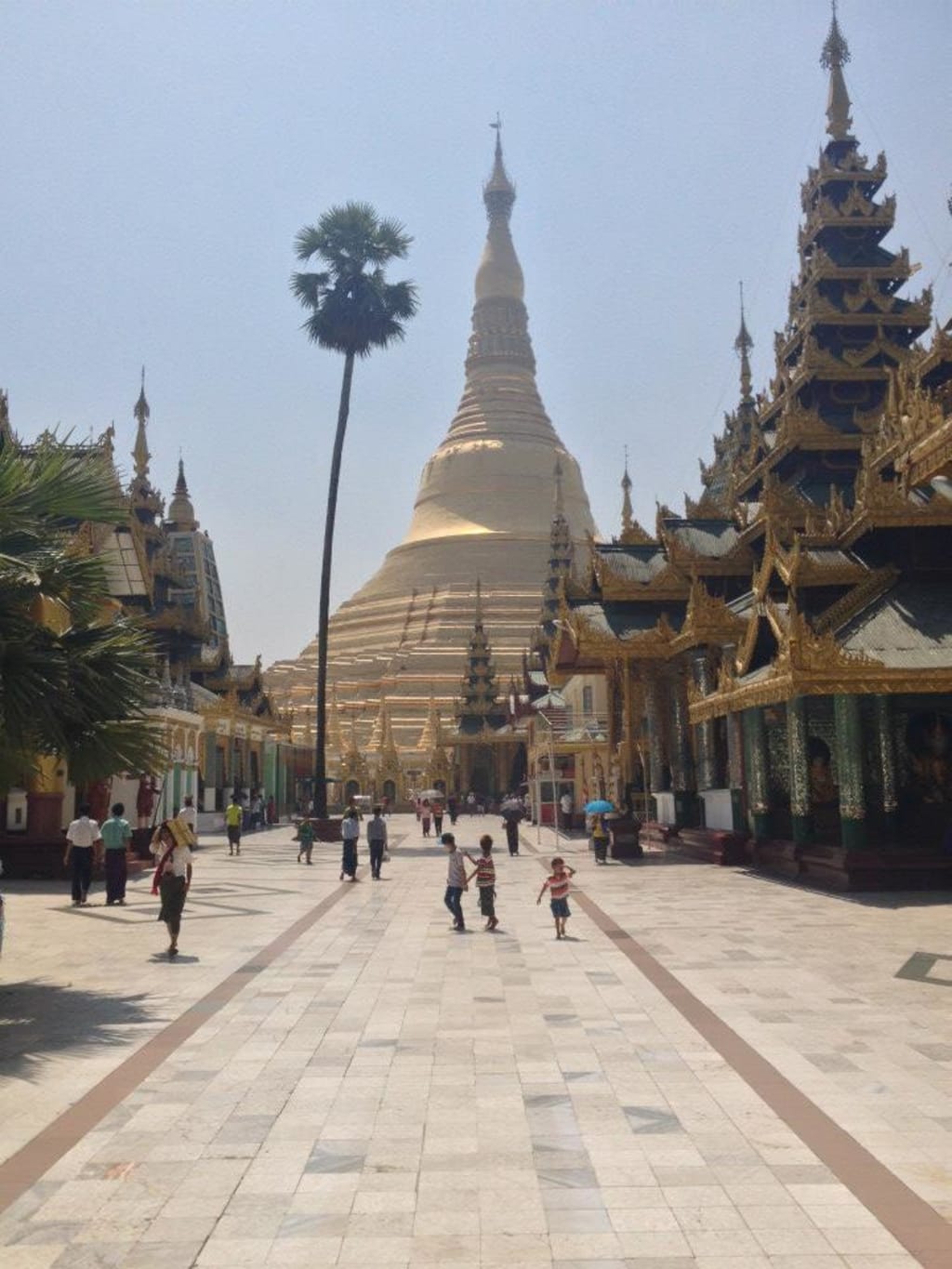Yangon to Naypyidaw
By: Robert Pettus

I wrenched open my heavy eyes. I was only half conscious. Hot, swampy gusts from the opened windows buffeted my face – the smell of the outside jungle circulated through the train. I was dehydrated. My head throbbed; I was hungover. Three 24oz. bottles of ABC beer – a stout popularized in Myanmar due to years of British occupation – stood jiggling with the rattle of the train on the rusted metal tray table in front of me. Those weren’t the only beers I had drunk the previous evening. I had a hell of a time in the restaurant car, talking – along with my British colleague, Ben – with some locals. We drank to excess the two beers – Myanmar Pilsner and ABC stout – which are popular in the country, conversing in what broken language we could each use. We chewed betel, which I had wanted to try for some time. I didn’t feel much of the stimulating effects – maybe I wasn’t doing it right – but it did turn my mouth and teeth red, of which I was proud. I felt like I was getting the true Burmese experience. I wasn’t sure how I wound up in my current location, however. It didn’t look familiar. The outside sky was still dark, but morning was breaking slowly. Thick dew from the outside jungle spritzed my face as I stared out the rushing window. I drank it in greedily.
The train was moving noticeably faster than it had the previous evening. I looked to the adjacent seat; Ben was there snoozing. He snored, turning his face into the wind, sniffing at the breeze coming in from the lush rainforest. Our train car was crowded – much more crowded than it should be. People stood tightly packed, cradling bottles of water, bottles of beer, freshly picked corn, bags of chips, bags of rice, random souvenirs. I recognized these people as hawkers, but I wasn’t sure why they were still on the train. In Southeast Asia, when a train stops, numerous individuals jump aboard and try to sell things to the passengers. When the train departs, they hop off, back onto the platform. This group of salespeople had clearly missed their opportunity to depart. That happened occasionally – I was sure of that – but it was odd that such a large number had failed to disembark. They all stood wide-eyed, their heads darting frantically back and forth. They looked uneasy.
Ben was still sleeping. I nudged him:
“Yeah, yeah?” he said, “All good? You all right?”
“What the hell is going on here?” I responded.
“What do you mean?” he said.
I gestured to the crowd in our train car. Ben sat up, rubbing his eyes. He grabbed a nearly empty bottle of water sitting on his tray table, unscrewing and chugging the remnant liquid, then crushing the plastic between his hands.
“This is weird,” he said.
“Yeah, no shit,” I responded. “I’ve got to take a piss,” I said.
“It’s yours – take it!” said Ben, “You Americans go ahead and take everything you like!” Ben enjoyed making fun of American speech whenever possible, such as our tendency to use the verb take instead of have.
“I fucking will,” I said, lifting from my seat.
I shuffled through the nervous crowd to the toilet, which sat at the back of the train car. The train was wobbling unstably, causing my yellow, dehydrated piss to sway back and forth, not all of it making it into the grimy bowl. From the stench marinating in the cramped lavatory, I could tell this wasn’t an uncommon issue. The toilet emptied straight onto the train tracks. Staring down the tube, I could see the passing, whooshing wooden sleepers. This railway, like the trains themselves, were a remnant of the British Empire, which had governed Myanmar for over a hundred years, until the end of the World War II. The Burmese people I had spoken with recalled nostalgically British rule, but that wasn’t entirely fair, in my inexperienced outsider opinion. The British were rarely good to their imperial subjects, just ask the people of India, or my fellow citizens back in the States; people in Myanmar only appreciated the British because their subsequent, local leaders – specifically the general Ne Win-led military junta – were so abhorrent. Ne Win is one of the true, objective skid marks on the underpants of the human species, so much so that his memory sparks within the average Burmese citizen fondness for the British Empire.
I walked out of the lavatory back into the train car, which was still packed. Stumbling along the center aisle, rocking with the chugging train, and attempting to avoid bumping into people, I made it back to my seat.
“Let’s go, mate,” said Ben, looking up from his seat wearily, “I’m fuckin’ famished; let’s head over to the restaurant car – see if they have any more of those Chinese noodles.”
Ben disliked Burmese food, so every meal he ordered Chinese dishes, which most restaurants carried.
I looked around. If the other train cars were as packed as this one, making it back to the restaurant car was going to be a real chore.
The train shook. Falling backward momentarily, I caught myself on the metal railing of the overhead compartment. The train seemed to speed up even more.
“Is the train a little out of control, do you think?” I asked Ben. He looked around, as if noticing it for the first time.
“Now that you mention it – it sure as shit is! Maybe that explains all the merchants standing around. You think they got stuck aboard?”
I shrugged in ignorance: “Let’s ask around at the restaurant car,” I said, “Someone there will know what’s going on, and they’ll probably be able to explain it to us in English.”
The two of us sidled in the narrow space between the rows of seats and the crowd, trying to avoid falling into anyone as we surfed uneasily with the constant motion of the train. Most of the people were still loitering uncertainly, but some of the more entrepreneurial individuals set down their wares and moved toward us.
“You going to restaurant car?” one of them yelled over the whir of the train. It was a trio of young boys, probably less than twenty years old. They were wearing thin, short-sleeved button up shirts and blue and black plaid longyi. They smiled at us, placing their hands on their hips. Red betel juice stained their teeth:
“I take you there!” One of them said, pointing a finger into the air.
“Oh yeah?” said Ben, “Thanks a bunch! We’d appreciate it.”
The young men, without wasting a moment, pushed through the crowd, removing stagnant individuals from the path as they paved our way to the restaurant car. Upon arrival, they each turned and got uncomfortably close to our faces:
“Money, money, money!” they said in unison, clasping and unclasping their palms to signal their desire for payment. I reached into my pocket and pulled out a 500 kyat note (about 30 cents) and gave it to one of the boys. He looked at it in disgust and the glared at me:
“Five dollar,” he said, “America dollar.”.
I took a five-dollar bill from my wallet and gave it to him. He grabbed it, holding it up to his eye, examining it for defects. He squinted angrily, making threatening eye-contact with Abraham Lincoln.
Burmese salespeople are prone to ask for USD from tourists, due to the instability of their local currency. They also prefer USD that is in untampered, mint condition. If there are creases or crumbles in the paper, many merchants are unlikely to accept it. This is due to the historical economic instability in Myanmar, specifically – in this case – because of events which instantly demonetized previously legal tender; most notably when Ne Win at a single stroke neutralized nearly three quarters of the national currency, in 1987. The Burmese people are skeptical about the validity of money because they have good reason to be.
He finally accepted the bill, placing it gently in a paper envelope, which he then placed in a plastic baggie, which he zipped closed and slid into the brown satchel hanging loosely from his shoulder. The three of them disappeared back into the crowd.
The restaurant car was mostly empty – wasting money on food while on a train didn’t seem to be a popular activity in Myanmar. Only a couple of the eight or ten tables were occupied; sitting at one of them was an ageing individual. His skin was cracked from decades in the beating, tropical sun. He was wearing a short-sleeved, white button-up shirt, a red longyi, and flip-flops. He was drinking from a bottle of Myanmar beer and picking at his plate, which held remnant leafy lahpet, the sour aroma of which – despite the thick, gusting winds of the opened windows – filled the restaurant car.
“Excuse me, sir,” said Ben, approaching the man, “Do you happen to speak English?”
The man looked up from his plate wordlessly. He squinted his eyes at Ben in apparent annoyance.
Ben turned his shoulder and looked back to me: “I don’t think he understands,” he said, “Let’s sit down and grab some food and a brew. Maybe we’ll figure out what’s going on by people-watching.”
“What do you want?” said the man, pulling a fat cheroot from his pocket and striking a knockoff zippo lighter to it. As he puffed, thick, grassy-smelling smoke swarmed the area surrounding the man’s table, causing Ben to go into a coughing fit.
“Do you have any idea what’s going on?” I said, “The train is packed with merchants, and it keeps speeding up.”
“Hadn’t noticed,” he said, looking around, “But now that you mention it, this train is moving pretty damn fast. I didn’t know these dinosaurs could get going like this anymore.”
“So what’s happening? Does this happen often?”
“No,” responded the man, “Never seen it happen before. Maybe the conductor jumped ship, or died.”
He then chuckled to himself, puffing his cheroot.
Paralyzing, fearful anxiety abruptly invaded my psyche, causing me to feel simultaneously both entirely exhausted and mind-numbingly paranoid. I took a step back, anxious sweat painting my brow as I grabbed at a nearby chair for stability. I was light-headed.
Ben’s head—his hands still on his knees – emerged from below the table, back into the conversation.
“The conductor is what?” he said, “Did you say he’s dead?”
“I don’t know anything about the conductor,” said the man, “How the hell should I know him? Only thing I know is that you’re right – the train is speeding up. Conductor, or lack of conductor, is probably the cause.”
“What the fuck!” said Ben.
“We need to get to the conductor’s car,” I said.
“Yeah?” said Ben, “And how in the hell are we supposed to do that? We’re a couple of foreigners – no one is going to believe that we know what the hell is going on, because we don’t!”
“Well, we’re going to have to pretend like we do.”
The man looked up: “I’ll show you to the conductor’s car,” he said, “You won’t be able to get there on your own; you have to go through the sleeper-cars to get there. They won’t let you through there, unless you can think up a good story, which – considering you can’t speak Burmese – I’m guessing neither of you will be able to do.”
“Good point,” I said, “Thanks for your help, sir.”
The sleeper-cars shook and rattled with the rumble of the speeding train. The grating sound had awakened many people, who now sat nervously in the dark shelter of their beds. Out from within one of the bed-cabins shone a floating, glittering gold. It then blinked – black ovals in the center of the shining gold being split, the floating circle becoming briefly completely golden. I stared with immature longevity into that cabin, finally noticing that it was a woman, cradling her young child. Her face was painted with bright thanaka. Her child was sleeping. She looked afraid.
“Come on,” said the man, who had on the way over introduced himself as Khin Maung, “We may not have time to be wasting.”
We continued trudging through the dark sleeper-car, shaking back and forth with the rumble of the tracks. Ben, losing his balance, fell into one of the mattresses, being immediately scolded by an ageing man.
The window to the conductor’s car was up ahead. Upon arrival, Khin Maung planted both hands upon the glass and peered inside. After staring for some time, he turned back to us, the sweaty prints of his cupped hands now lining the window like an alien clam. We were standing in between the cars. The jungle flew by on either side of me as I grabbed a nearby rusted handrail for balance.
“Conductors on the floor,” said Khin Maung, “It doesn’t look good. We’re going to have to break this window – door’s locked.”
Without further warning, Khin Maung took off his button-up, wrapped it around his elbow, and smashed into the window. It didn’t break, not at first – it was thick glass. He delivered one blow after another, the glass finally cracking – blood soaking through his shirt. Upon shattering the glass completely, he unraveled his shirt and tossed it out onto the blur of the tracks. Blood spilled from his cut-up and bruised elbow, but he didn’t seem to notice. Khin Maung reached into the door and opened it from the other side.
Entering the room, we saw the conductor laying lifeless on the floor. He was sprawled out, his arms and legs flailing in every direction, much like a prototypical picture of a white-taped crime scene. Khin Maung bent down and began digging through the conductor’s pockets.
“Nothing useful,” he said, looking up to the conductor’s seat, “Either of you know how to operate a train?”
“Hell no!” said Ben, “How in the fuck am I supposed to know how to do that?”
“Neither do I,” said Khin Maung, standing up from his place beside the fallen conductor, walking immediately to the conductor’s seat. He looked hopelessly at all the buttons and levers, before finally noticing a red-handled, hanging emergency break.
Khin Maung pulled it, but nothing happened. He pulled it again and again, holding it down for minutes at a time, but there was no response from the speeding train.
“What the fuck!” said Ben.
The train barreled out of the jungle and into a more urban environment. Unlike the suburban areas of Yangon, which were carpeted with layers of plastic waste, this city looked more organized. Where the outskirts of Yangon were lined with thatched huts, wooden planks, polluted creeks, and muddy paths winding through dense slums, this city was more modern looking. More modern, though significantly less populated – somehow less alive.
“This isn’t good,” said Khin Maung, pointing outside at a large, passing sign, “We’re approaching Naypyidaw station. The train won’t be able to barrel through there – we’re going to crash.”
Khin Maung pulled the emergency break again. He then started frantically pressing buttons and pulling levers, but nothing worked. He stared out the front window, gazing ahead fearfully before turning back to me and Ben.
“You need to get off the train,” he said, “This thing isn’t stopping – there’s isn’t enough time.”
Frantic, I backed away, out of the conductor’s car. I again grabbed the handrail in the outside area between the conductor’s car and the sleeper cars. Looking inside the sleeper-cars, I saw terrified individuals scrambling to exit the train. They were jumping out windows, running for the doors. Some of them pushed by me, throwing themselves out into the now bright morning. I looked outward, down to the whooshing tracks. I needed to jump. I looked to Ben, he nodded.
I jumped.
About the Creator
Robert Pettus
Robert writes mostly horror shorts. His first novel, titled Abry, was recently published:
https://www.barnesandnoble.com/w/abry-robert-pettus/1143236422;jsessionid=8F9E5C32CDD6AFB54D5BC65CD01A4EA2.prodny_store01-atgap06?ean=9781950464333






Comments
There are no comments for this story
Be the first to respond and start the conversation.